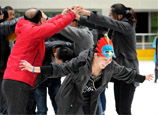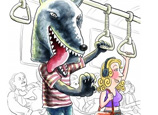Fragmented life
As the fragmentation of our lives deepens, our attention span is now measured in seconds, just enough for consuming a weibo or blog entry, but markedly inadequate for reading a serious novel or learned paper.
The online world is dictating a new paradigm, a new code of ethics in which the most unusual, unexpected, unconventional, or funny acts have the best chance of being noticed. Online celebrities are our teachers, role models, heroes.
A kindergarten teacher in Zhejiang Province dragged a child off the ground by his ears so that she could become an online hit. She succeeded.
On August 9, an intoxicated woman in Shanghai was still writing on her weibo account shortly before her fatal car crash.
There was also a handsomely paid young man who gave an online, live broadcast of his last hours before he successfully hanged himself.
All the world is a stage, and people go about life more and more like actors, throbbing with excitement in anticipation of rave review.
Often have I seen some young passengers whose eyes remained glued to their hand-held screens even while elbowing their way into or out of a crowded metro, totally oblivious to the motley crowd bustling around them.
You can be persuaded that life, in its unedited, unenhanced version, is losing favor, like the worst flop of the season.
So the latest People's Daily initiative of flirting with online coinage is no less than a serious attempt to bridge the widening gap between traditional mainstream media, and the brave online world.
Similarly governments at various levels are aggressively leveraging weibo as a new tool in information release or crisis management, in their eagerness to create the image of serving the people. Meanwhile, cyberspace and modernity continue to fragment life and repackage it in conveniently attractively bits of fast food.
【1】 【2】 【3】 【4】 Recommendations:
News we recommend





















 Beijing experiences windy weather, temperature drop
Beijing experiences windy weather, temperature drop


![]()
